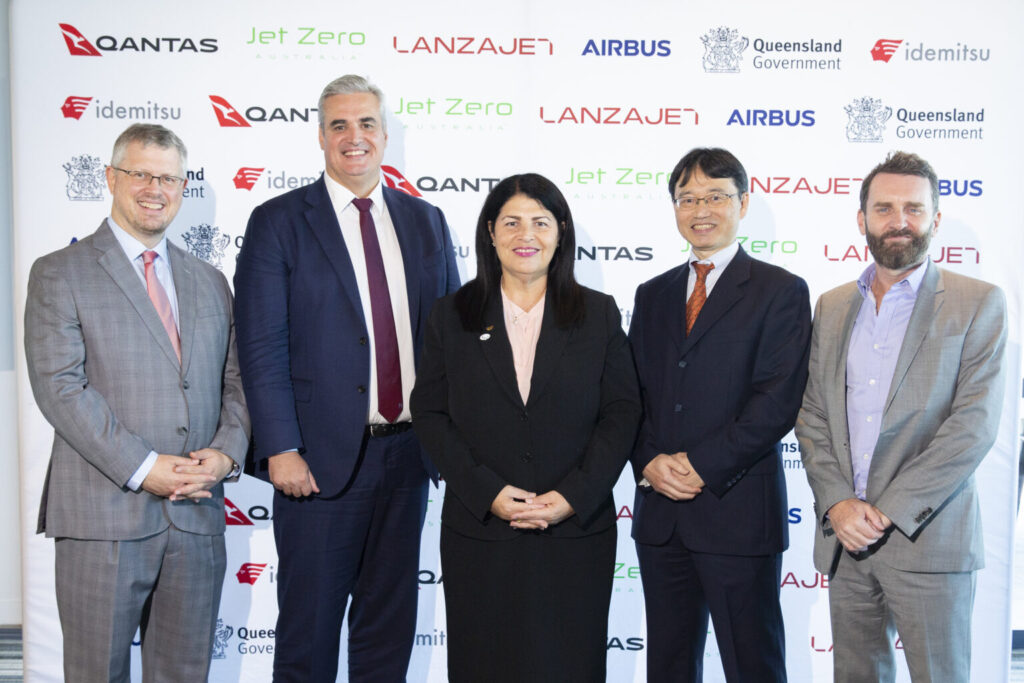Idemitsu, Qantas and Airbus back Australian Sustainable Aviation Fuel Refiner Jet Zero with $19.2 Million

|
Listen to this story:
|
Jet Zero Australia Pty Ltd (Jet Zero Australia) has achieved a significant milestone by successfully receiving funding commitments of A$29 million(1). This is a crucial step towards advancing the engineering activities of Jet Zero Australia’s flagship Alcohol-to-Jet (ATJ) Sustainable Aviation Fuel (SAF) project, Project Ulysses, in North Queensland, Australia.
Funding will also support advancement of other renewable fuel opportunities in the region, many of which will leverage and support Queensland’s globally competitive agricultural sector.
The placement, managed by Barrenjoey, has been strongly supported by Jet Zero Australia’s foundational investors, including Qantas and Airbus who are committed to accelerating the establishment of a SAF industry in Australia.
We are also pleased to announce the addition of a new strategic shareholder, Idemitsu Kosan Co Ltd (Idemitsu), one of Japan’s largest energy conglomerates. This marks Idemitsu’s first investment in a SAF project outside Japan.
Project Ulysses, which has now completeda feasibility study initiated in 2022 with the backing of a A$760,000 grant from the Queensland Government, and has recently applied for additionalgrant support from the federal governmentwhich, if successful, will further assist the Project’s continued development into Front End Engineering and Design (FEED). Jet Zero has also made an application to the Queensland Government’s Industry Partnership Program to assist the Project move towards Final Investment Decision (FID), construction and operation of the facility.
Project Ulysses is targeting annual production of 102 million litres of SAF and 11 million litres of renewable diesel once operational.
Idemitsu representative, Masahiko Sawa, Managing Executive Officer, Assistant to Chief Executive Officer, (Manufacturing & Technology, Basic Chemicals and Carbon Neutral Transformation), Head of CNX Strategy Headquarters commented: “Idemitsu Kosan is working to establish SAF production in Japan with an annual capacity of 500,000 kilo litres (500M litres) in order to achieve the government and aviation industry’s goal of replacing 10% of Japan’s jet fuel consumption with SAF by 2030. This investment agreement represents our first investment in an overseas SAF project and will contribute to the establishment and strengthening of the global SAF supply chain. Australia, especially Queensland, is an important business partner, and we hope to build a bridge between the two countries in the world of carbon neutrality in addition to the resources business.”
Queensland State Development Minister, Grace Grace, commented: “The Miles Government is proud to have been an early supporter of Project Ulysses, providing $760,000 in seed funding back in 2022. Today’s milestone is another big step towards 1,000 construction jobs and 100 refinery jobs, bringing opportunities for agriculture, aviation, defence, and tourism.
“Queensland’s renewable energy advantage means we can protect and grow regional jobs in high tech sectors like this one. We are leading the nation in this area, and the Miles Government is focused on securing our state’s future as a trailblazer in the sustainable aviation fuel industry. We look forward to our continuing work with Jet Zero to progress this game changing opportunity for Queensland.”
Airbus Chief Representative, Australia, New Zealand and the Pacific, Stephen Forshaw, commented: “We are delighted to see Jet Zero Australia’s continued expansion, and the confidence from others in its planning process as it moves toward key decisions on its first SAF production facility in Australia. The continuing support from the Queensland Government is important, as the right policy frameworks are critical for developing a successful SAF industry here. Australia needs onshore SAF production. This is a crucial first step, but Australia will need more SAF in coming years, and more investment to make it happen. The objective of our initial investment was to test the feasibility of Jet Zero’s Alcohol-to-Jet approach. With that proven, it is exciting to see the company moving forward and we look forward to supporting it through these crucial milestones.”
Qantas Group Chief Sustainability Officer, Andrew Parker, said: “A domestic sustainable aviation fuel industry is critical to Australia meeting its emissions reductions targets. Our early investment in Jet Zero’s project was a vote of confidence in its viability and we’re pleased to be able to continue that support at this funding round and we’re pleased to see a major international capital partner has now come onboard. Producing sustainable aviation fuel onshore has the potential to create 18,000 jobs and generate $13 billion in economic benefits annually by 2040 in addition to increasing Australia’s domestic fuel security. With the right policy settings and support from governments, we’ll be able to capitalise on the significant benefits and natural advantages that Australia has for SAF production.”
Related Article: British Airways owner IAG signs biggest ever deal for sustainable aviation fuel of nearly 1 billion litres
Jet Zero Australia CEO, Ed Mason, commented: “Project Ulysses will play a very important role in the growing momentum towards decarbonising the Australian aviation sector while providing fuel security and also developing a new industry in North Queensland. The ongoing support from Qantas and Airbus, two leaders in the Australian and international aviation sectors, as well as ongoing investment from our existing shareholders Chancery Hill, Dragonfly Enviro Capital and Audacy has remained crucial to the project’s success. We also welcome Idemitsu as a strategic shareholder with significant financial backing and capabilities in project development and renewable fuels. Alongside Qantas and Airbus, the addition of Idemitsu is a huge boost in our ability to fund the success and future development of our Australian SAF projects.”






